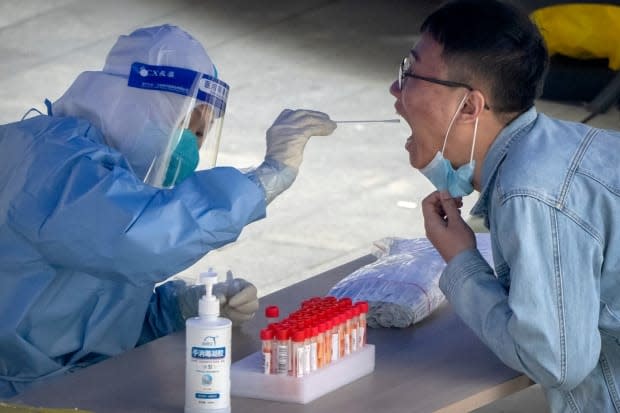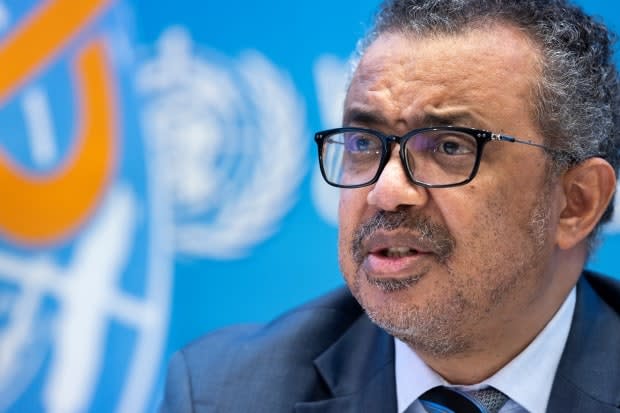Legal experts accuse Leslyn Lewis of 'fearmongering' over WHO pandemic pact

Conservative leadership hopeful Leslyn Lewis has outlined a frightening scenario: if Canada signs an international pandemic treaty, Canadians' travel and medication choices could be restricted, the Constitution could be suspended and it could all pave the way for a global government.
Lewis made those claims in a half-hour-long live event broadcast on Facebook and Twitter Wednesday night. They build on arguments she has made already about the dangers involved in Canada signing the World Health Organization's Pandemic Response Treaty.
Several legal experts say her claims are completely untrue.
"This is all just nonsense," said Prof. Steven Hoffman, a professor in global health, law and political science at York University.
"This is not at all what is being discussed. It's just trying to get people to be mad at a non-issue. This is really a conspiracy theory that we're seeing unfold in front of our eyes."
Lewis' comments are alarming, said another expert.
"The bottom line is that her claims are so far from the truth that it's actually hard to know where to begin," said Prof. Kelley Lee, Canada Research Chair in Global Health Governance at Simon Fraser University.
In the video, Lewis claims the WHO could impose lockdowns and restrictions in Canada as it sees fit, and could restrict the types of medications doctors could prescribe.
"It could give power for … the WHO to determine whether or not [in] a country like Canada, whether you'd be able to travel within or outside the country depending on the severity of the pandemic," said Lewis, who holds a PhD in international law from York University.
Lewis also claimed the treaty would allow the WHO to suspend the constitutions of signatory nations.
"Think about it — you would not be able to hold your elected officials accountable for the action of the WHO," she said. "It is essentially eroding our democracy."
'They just don't have the power to do that'
"This is nothing more than fearmongering. There is nothing to support these really strong assertions," said Prof. Timothy Caulfield, Canada Research Chair in Health Law and Policy at the University of Alberta.
"There is no treaty the WHO could negotiate that would suspend our Constitution. They just don't have the power to do that."
In the video, Lewis holds up a WHO document and repeatedly cites specific sections.
That document, said Hoffman, is not directly connected to the treaty. It's the interim report of a working group looking at the broader issue of dealing with health emergencies.

Hoffman collaborates with the WHO on a project about antimicrobial resistance but said he receives no funding from the organization.
"She's pointing to the wrong document to show things that don't actually exist," said Hoffman, who worked for the WHO about a decade ago and has written critically about the organization.
Lee also said that while the document looks at how the WHO might respond better in a pandemic, it's not specific to the pandemic treaty.
What the treaty will and won't do
Despite Lewis' claims, the WHO cannot do anything without the consent of member states, said Lee, who has been studying the organization for three decades. She said her work has included writing reports for the WHO itself on subjects such as globalization and infectious diseases.
Lewis told her audience that the treaty would lay "the foundation for an area of global government" where sovereign nations could "cede their rights to these global organizations."
"I find it really irresponsible to put these fears into people's minds that actually are so far from what's being discussed," said Lee.
"It's dangerous and it slows us down in terms of trying to create something that will keep us all safer."

The WHO describes the treaty as "aimed at protecting the world from future infectious diseases crises."
The treaty is meant to ensure countries do a better job of sharing information on disease surveillance, said Lee.
Hoffman said the early global response to the pandemic was hampered by a delay in the exchange of vital information and virus samples between nations.
"That's bad," he said. "That needs to change."
Lewis has launched a petition to oppose Canada signing the treaty. The petition had more than 14,000 signatures as of Thursday afternoon, according to the count posted on her website.
She is also encouraging people to reach out to their MPs, senators and leaders in both the House of Commons and the Senate about their concerns before the WHO meets for its World Health Assembly in Geneva, beginning on May 22, where the treaty will be discussed.
'It erodes trust in our institutions'
Lewis has warned the treaty would undermine democracy by taking power away from Canadian politicians. Caulfield said Lewis is the one causing damage with her unsupported claims.
"It erodes trust in our institutions, trust that is needed perhaps in the future if we're going to deal with another pandemic," he said.
Lewis stood up in the House of Commons Wednesday to raise concerns about the treaty — but her questions to Prime Minister Justin Trudeau were more understated than the statements she would raise hours later online.
"Why did the prime minister not establish a public health inquiry into our COVID response before considering signing amendments to the international health regulations?" she asked.
Trudeau said part of Canada's role at the WHO is to push for "better science."
"We will continue to be active, strong participants in international fora around health while always respecting and protecting Canada's sovereignty and choices to make the right decisions for its own citizens," he added.


